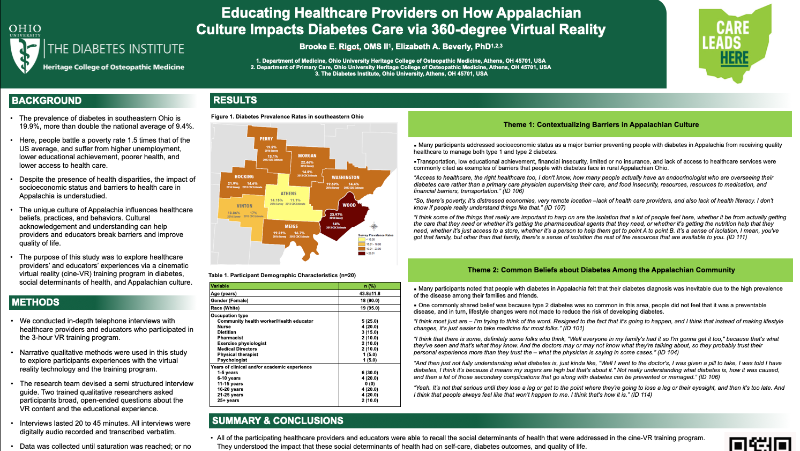
Leading through advocacy, education, and relationships
Educating Healthcare Providers on How Appalachian Culture Impacts Diabetes Care via 360-degree Virtual Reality
Category: 2021
Author: Brooke Rigot
Institution Affiliation: Ohio University Heritage College of Osteopathic Medicine
Educating Healthcare Providers on How Appalachian Culture Impacts Diabetes Care via 360-degree Virtual Reality Brooke E. Rigot, OMS II, Elizabeth A. Beverly, PhD Ohio University Heritage College of Osteopathic Medicine, Athens, OH 45701 Introduction: In southeastern Appalachian Ohio, the prevalence of diabetes is 19.9%, nearly double the national average of 10.5%. Also, the poverty rate is 1.5 times greater than the national average. Further, the culture of Appalachia influences healthcare beliefs, practices, and behaviors. Training that addresses social determinants of health and promotes cultural understanding may help healthcare providers break barriers and improve diabetes outcomes. Objective: The purpose of this study was to explore healthcare providers’ and educators’ experiences of a cinematic virtual reality (cine-VR) training program on diabetes, social determinants of health, and Appalachian culture. Methods: Participants completed a 3-hour cine-VR training program in diabetes, social determinants of health, and Appalachian culture. Then, they participated in a follow-up telephone interview in which trained qualitative researchers asked broad, open-ended questions about the cine-VR content and the educational experience. These interviews lasted 20-45 minutes and all interviews were audio recorded and transcribed verbatim. Data was collected until saturation was reached or no new information was gathered from the interviews. Finally, NVivo 12 software was used to facilitate content and thematic analyses. Results: A total of 20 healthcare providers and health educators (age=43.8±11.8 years, 80% female, 95% white) participated. Qualitative analysis revealed two themes: 1) Contextualizing Barriers in Appalachian Culture: All of the participants were able to recall the social determinants of health addressed in the program. They understood the impact that these social determinants of health had on self-care, diabetes outcomes, and quality of life. 2) Common Beliefs about Diabetes among the Appalachian Community: Participants described diabetes fatalism or the feeling of inevitability that people in Appalachia would develop diabetes because all of their family members and friends had diabetes. They shared the belief that people did not feel that it was a preventable disease, so lifestyle changes were implemented to reduce the risk of developing diabetes. Conclusion: The participating healthcare providers and educators found the cine-VR training useful to understanding the unique culture and barriers to healthcare in Appalachian Ohio. The cine-VR technology offers participants a glimpse into the lives of people with diabetes and culture of the region. This type of training is invaluable to geographically and culturally distinct regions like Appalachian Ohio.
Watch Video
 Phone: 567-712-0697
Phone: 567-712-0697
